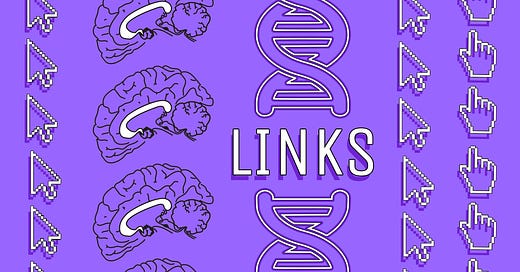LINKS - May 1st, 2024
Welcome to LINKS — my attempt to provide Rhapsody readers with five interesting stories that tell us something about what it means to be human . LINKS is published every Wednesday. Have a link you want to share? Drop it in the comments.
Do ‘Griefbots’ Help Mourners Deal With Loss?
Public health and technology experts, such as Linnea Laestadius of the University of Wisconsin-Milwaukee, are concerned griefbots could trap mourners in secluded online conversations, unable to move on with their lives. Her work on chatbots suggests people can form strong emotional ties to virtual personas that make them dependent on the program for emotional support. Given how hard it is to predict how such chatbots will affect the way people grieve, Sofka wrote in an email, “it’s challenging for social scientists to develop research questions that capture all possible reactions to this new technology.”
The Glorious Proletarian Theater of Pro Wrestling
By Kim Kelly, The Nation
“In a bittersweet moment, I realized we were just a few blocks up from the Sheet Metal Workers union hall. Union labor had built the hall we occupied, yet the workers performing in the ring that night were wholly on their own. Other professional athletes are represented by their own powerful unions, and benefit mightily from that collective power. Meanwhile, their bedazzled counterparts in this fundamentally working-class sport are left out in the cold, abandoned by labor laws, and exploited by greedy big-wig promoters. That’s probably why the pro wrestling community is so tightly knit—it really is them against the world.”
Electricity creates consciousness: Why our idea of consciousness may be wrong
From iai News
“How could calcium ions rushing through a membrane generate the taste of coffee, the smell of a rose or the feeling of love? Join celebrated biochemist, Nick Lane, as he argues that the deep logic of life is at root an electrical phenomenon.”
‘Flavorama’ guides readers through the complex landscape of flavor
“Flavorama is split into sections that each feature one of Johnson’s laws of flavor. After establishing that ‘Flavor is molecules,’ she moves on to ‘Flavor is taste and smell.’ Smell, perhaps counterintuitively, often influences flavor more than taste does, thanks to the numerous smell receptors, she explains. Smell can also evoke emotional memories more intensely than other sensory inputs. Hand-drawn illustrations of the human brain and nasal cavity explain why by showing how nerve cells that line the roof of the nasal cavity detect scent molecules and send signals directly to the limbic system, a part of the brain that handles feelings and memories. Other sensory inputs, in contrast, are first processed in different parts of the brain before arriving at the limbic system.”
Teens see social media algorithms as accurate reflections of themselves, study finds
By Nora McDonald, The Conversation
“It turns out that the teens we interviewed believe social media algorithms like TikTok’s have gotten so good that they see the reflections of themselves in social media as quite accurate. So much so that teens are quick to attribute content inconsistencies with their self-image as anomalies – for instance, the result of inadvertent engagement with past content, or just a glitch.”




